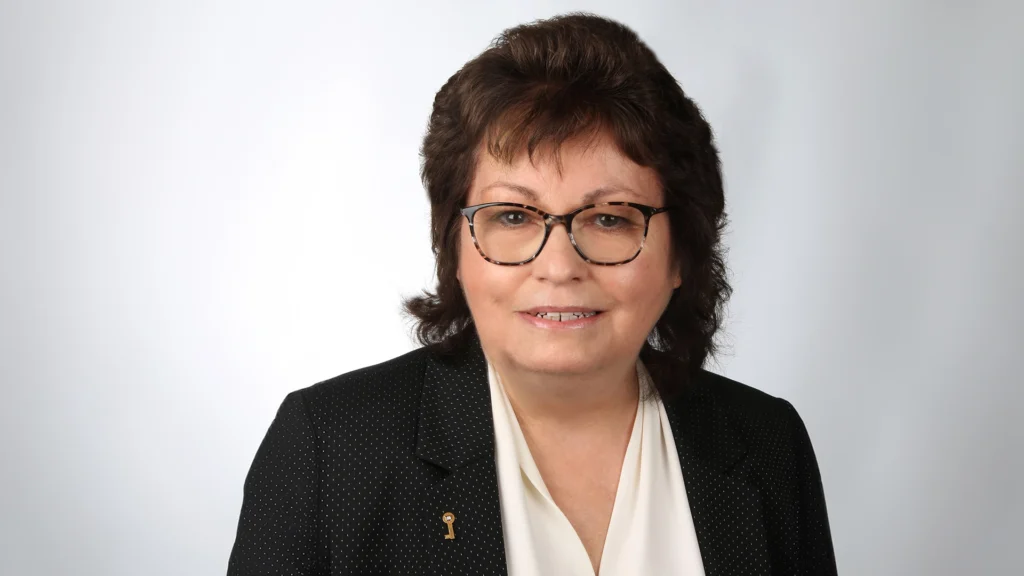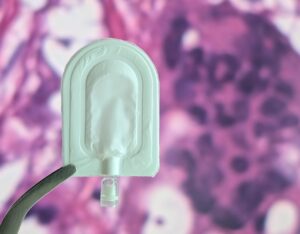
From years of burdensome insulin injections to the insulin pump that saved her life.
Lynn Cameron is a passionate advocate at Breakthrough T1D, fiercely pursuing positive change for Quebec’s type 1 diabetes (T1D) community, which desperately requires public coverage of T1D devices. Lynn has lived with this autoimmune disease for nearly 60 years, many of which she endured without access to the advanced technology she needed to thrive. Over the past five decades in her T1D journey, she has overcome countless obstacles, compounded by the burden of self-advocacy for the care she deserves.
Lynn is 63 years old, and due to Quebec’s age restriction on its public coverage (only available to those who enroll in the program under age 18 and are then covered for life), she and over 40,000 adults in her province do not qualify. This creates inequity among Quebecers living with T1D merely based on their age of diagnosis. No individual living with T1D should suffer because of their age or geographical location. That’s why Lynn continues to stand up for all those living with T1D, determined to ensure no one else goes through what she has. She hopes her story can help others and inspire critical change.
Lynn doesn’t remember life before type 1 diabetes. “It’s been so many years; I don’t count anymore. I don’t remember not being diabetic. I was young. The only thing I remember was the first insulin shot my father gave me,” she says.
In 1967, at the time of Lynn’s diagnosis, diabetes technology and care were vastly different than they are today. Insulin syringes were only available in whole-unit increments rather than half-units. This meant less control over how much insulin she could administer, leading to increased blood glucose fluctuations. The insulins also kept changing, and Lynn says she was allergic to one which is no longer on the market today. Dieticians were not part of diabetes care, even though carb counting and knowing how different foods impact blood glucose are essential for T1D management. All these factors made life with T1D difficult for Lynn.
“When I was diagnosed, I was told that you have to be careful about what you eat and have to be active and do everything correctly,” Lynn says, “I was always up and down [blood glucose levels], and it was not because I was not doing or watching what I was supposed to do.”
These challenges fluctuated over the years, after a difficult childhood, adjusting to life with T1D and undergoing heart surgery at the age of 10. As an adult, Lynn relished any opportunity to be active outdoors until diabetes complications started taking a toll on her health.
In 2012, Lynn began trying to get an insulin pump to improve her quality of life after enduring multiple daily injections (MDI) for 45 years. She tried hard to convince the RAMQ, Quebec’s government health insurance board, to cover pumps. It wasn’t until 2021, after nine years of self-advocating, that Lynn finally received her insulin pump, covered until December 2025—not by her own government but by donors to a hospital foundation.
“When I got the insulin pump, things did change so much, and I got better,” Lynn says. Since being on the insulin pump, her blood glucose levels have improved significantly.
Recently, this technology also allowed her to receive a second heart surgery, without which she would not be alive today. Doctors don’t always allow patients to wear insulin pumps during surgery, making this a significant step in diabetes care in Quebec. After waking up from the operation, Lynn was shocked to see her blood glucose stable. She asked the doctor what he did, and he said that the insulin pump, her external organ, did all the work. “That was a gift of life,” Lynn says, “because if I wouldn’t have been on the insulin pump, they wouldn’t have operated, and I wouldn’t be here.”
This is why advocating for access to life-saving devices is so close to Lynn’s heart. She says, “It’s 2025; it shouldn’t be like this. That’s why I’m doing what I can to work with Percée DT1 [Breakthrough T1D] and giving my time because of their mission. I think that insulin pumps will be temporary for about 10 years, and then probably there’s going to be a cure.”
Lynn’s incredible efforts include meeting with elected Members of the National Assembly (MNAs) of the official opposition in Quebec to share her story and lobby for adult coverage of insulin pumps for herself—she refuses to return to MDIs when her funding expires—and thousands of other Quebecers. She communicated the burden of MDIs, such as requiring 21 needles every three days compared to one with the pump, and the increase in daily decisions, which can lead to more errors in T1D management. Lynn is voicing her right to live, letting the province know that this situation undermines her integrity and dignity. She also supported Breakthrough T1D’s letter-writing campaign, helping acquire signatures of support from local MNAs.
Lynn’s resilience, tenacity, and dedication to her community are inspiring. She hopes sharing her story and advocating for better coverage will help others living with T1D.
Breakthrough T1D donor funding has contributed to nearly every major T1D advancement in the last 50-plus years. Generous leadership donors who invest in our $100M Campaign to Accelerate help ensure future T1D discoveries while advancing vital efforts, like Lynn’s, to improve care for all those living with T1D.
To learn about how you can become part of this invaluable community of philanthropists driving impact for the T1D community, please contact:
Kim Lacombe
Vice President, Philanthropy
klacombe@breakthroughT1D.ca
438-814-1668



